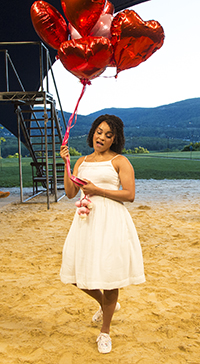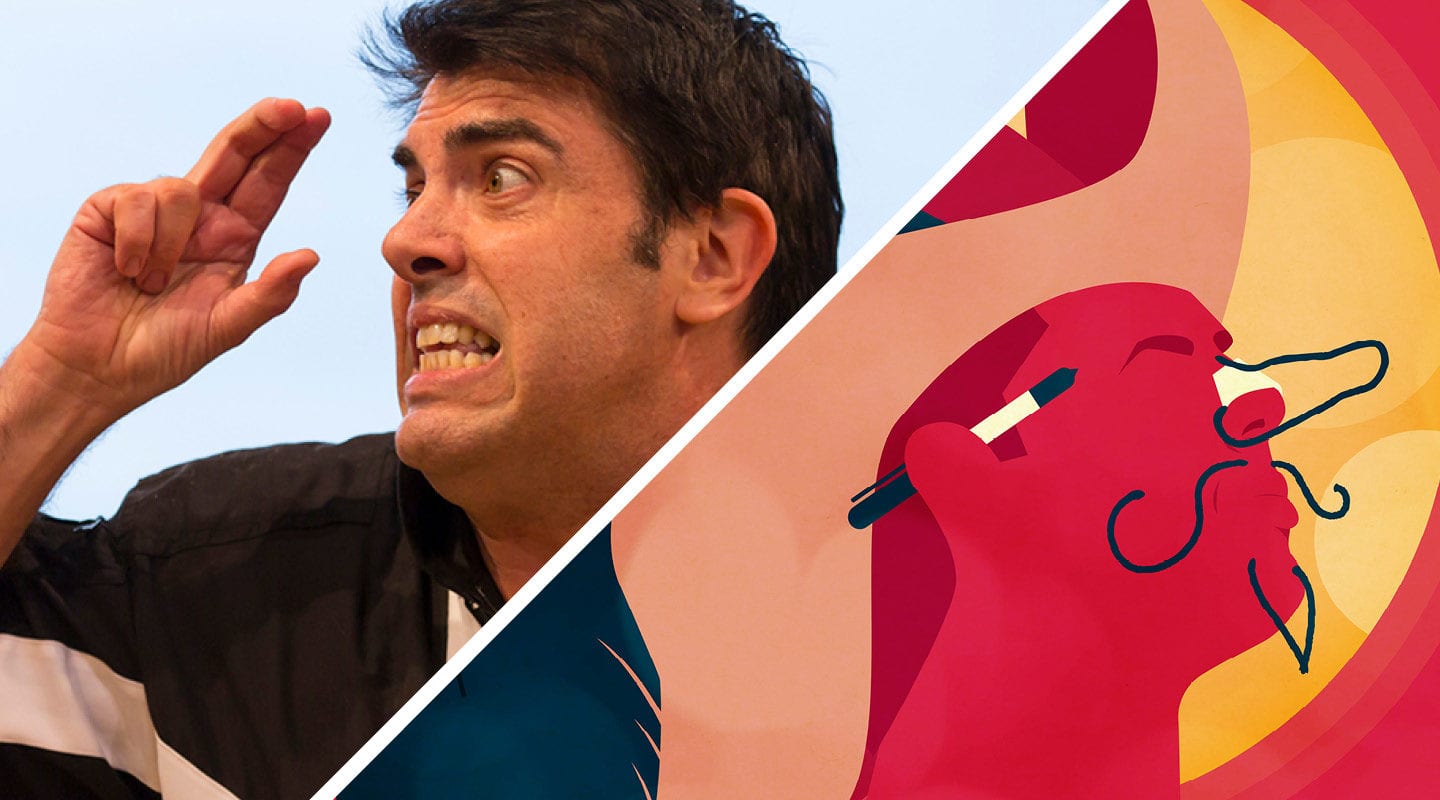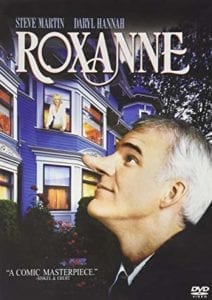Posted May 11, 2019
We caught up with longtime HVSF fan-favorite and CYRANO co-playwright Jason O’Connell to find out why he and his writing partner, Brenda Withers, took on this well-trodden romance. CYRANO previews begin on June 27, with direction by Meredith McDonough.
Get Tickets
You and Brenda both have unique histories with this play. Tell us about it?
I’ve always dreamed of playing Cyrano! I’ve come very close on a number of occasions – but for one reason or another, it just never came together. Brenda, on the other hand, has appeared in several different versions of Cyrano — as Roxane, and as other characters. She can also speak and read French, so she was able to refer back to the source material in a way that I couldn’t when we were writing together.
My fascination with the story started when I was a teenager and saw the movie Roxanne with Steve Martin. I saw more conventional versions of the story, too, and just found the character of Cyrano to be hysterically funny, beautiful, and complicated. It’s like he was Hamlet, but not Hamlet. Perceptive. Intelligent. His arc leads him through heartbreak and romance and loss, and there are so many different peaks to climb. I’ve heard that Edmund Rostand [playwright, Cyrano de Bergerac] himself was looking to create a character that was akin to Hamlet, but more accessible. The play Bernhardt/Hamlet deals with that a good bit, as Rostand and Cyrano are a big part of that story.
Now that you’ve been on the writing and directing side of the play, what jumped out at you that you hadn’t noticed before?
I find it so charming that each of the characters is fascinated with, or a practitioner of, the arts — even if that’s not their vocation. Take Rageneau, the baker, for example. In the original text, he loves artists so much that he is eaten out of house and home by them. He welcomes poets and artists into his shop with open arms. So we thought, we’ll just take his love of writing and poetry and build that into his character as sort of his moonlighting gig. He dreams of being a great writer. La Bret and Cyrano are military men, of course, but are also totally consumed by poetry, songwriting, and theater. You don’t often see that quality in characters like that. But there’s something beautiful about the way all these people are infused with art and language; you wouldn’t necessarily guess from looking at them that these are actually the storytellers of their society. We let that aspect inform the way we wrote this play.
 Also, even though Cyrano was a real person who lived, the play’s depiction of him feels like a teenage fantasy. For all his strengths, Cyrano represents all of our fragile, insecure, inner selves — our tender underbellies. I think that’s universal. Like, the rest of the world can say he’s a brilliant writer, a brilliant swordfighter, that he’s so brave, noble, and strong, that he can think on his feet, that he can beat up 100 guys, etc. Yet, on some level, he thinks he’s worthless – because of his looks, because the object of his affection doesn’t love him back. And there’s no harsher critic than ourselves, right? There’s always something we believe or can’t change about ourselves that makes us feel lacking. That even a big, bombastic, triumphant character like Cyrano feels this sense of entrapment and despair because of his nose — it’s a feeling that’s very personal, that’s universal.
Also, even though Cyrano was a real person who lived, the play’s depiction of him feels like a teenage fantasy. For all his strengths, Cyrano represents all of our fragile, insecure, inner selves — our tender underbellies. I think that’s universal. Like, the rest of the world can say he’s a brilliant writer, a brilliant swordfighter, that he’s so brave, noble, and strong, that he can think on his feet, that he can beat up 100 guys, etc. Yet, on some level, he thinks he’s worthless – because of his looks, because the object of his affection doesn’t love him back. And there’s no harsher critic than ourselves, right? There’s always something we believe or can’t change about ourselves that makes us feel lacking. That even a big, bombastic, triumphant character like Cyrano feels this sense of entrapment and despair because of his nose — it’s a feeling that’s very personal, that’s universal.
And it’s just such a teenage male fantasy! He’s lovely, and sweet… but so blind in so many ways. It’s like a 14 year old boy concocted the whole thing: ‘I can leap tall buildings in a single bound, but I have horrible acne, so there’s no way this perfect girl will ever notice me.’ Cyrano feels he is the best and the worst simultaneously – the most accomplished and the most hideous. He aggrandizes himself, even as he destroys himself. He operates on these dual planes. But that sense of “some day they’ll see” or “if only they understood the real me” is at the root of so many wish-fulfillment fantasies.
Speaking of fantasy, how did you and Brenda envision Cyrano’s dreamgirl, Roxane?

Britney Simpson, pictured at left in 2018’s THE TAMING OF THE SHREW, joins Jason onstage this summer as Roxane.
There’s something frustrating about Roxane’s traditional arc, honestly. She’s someone’s dream of a woman, a mirage or a figment for hungry imaginations. She is brilliant and beautiful and just out of reach. She is perfect. In the original text, she arrives on the battlefield – in the middle of the fighting – to deliver food and nourishment just when the men need her most. Do the bullets just fly past her? The intimation is that she is so ethereal and angelic, everyone and everything gives way to her. (I like to imagine her flying in with baskets of food like Captain Marvel.) In our version of the scene, we acknowledge that up-on-a-pedestal perception of her, but give the moment a twist. The problem is that she’s expected to embody the “perfect woman” instead of just being her own wonderful, flawed, complex self. (Interestingly, it takes two men – Cyrano’s wit paired with Christian’s looks – to embody the “perfect man” here.)
And because neither Cyrano nor Christian had faith in themselves – or in her ability to make a decision for herself – they trick her, and – as we see – she remains tricked for a very long time. That’s simply the story. But the worst part is that – in many versions – as soon as Roxane learns the truth about how she’s been deceived, the plot takes a turn that takes all the air out of her pain and anguish. She often doesn’t have a moment in which to say, “how dare you?! I can’t believe you’ve done this to me!” She immediately becomes a caretaker once more. So, we wanted to create a moment — and I hope we’ve done this — where the penny is allowed to truly drop for her. To give her an opportunity to feel her betrayal and get some of that frustration off her chest. I hadn’t really seen a version that adequately gave voice to that.
You have a lot of experience under the HVSF Theater Tent. What can audiences expect?
Even though we didn’t know the play would ever be performed at Hudson Valley Shakespeare when we were writing Cyrano, I always thought the wit and romance, the heightened stakes and the big emotions – joy, passion, anguish – were all ripe for that space. There’s a Shakespearean scope and quality to the story, and it’s just right for a festival that embraces theatricality and community.
The nature of the tent, the expanse of the grounds, the way every person under the tent can see every other person under the tent… that sense of community is so powerful, no matter the show. And even though this is a small cast version of Cyrano, the spirit of the play speaks to each of these five actors being us. They are you, they are me. They could all be sitting out in the audience in t-shirts and shorts before the show begins, and then jump right in to tell the story. And there’s something about how open, honest, playful, and generous the work under the tent is. You can’t be precious about things. You can’t hide. For example, we can almost never go to a true blackout out there. The audience can’t pretend to be watching a movie that’s exactly the same from night to night. There are too many variables. That’s what makes the stories feel so alive.
I’ve been talking with Meredith McDonough [CYRANO’s director] about what she and our designers are cooking up, and it’s really exciting. Of course, after ten years under the tent, I can visualize all sorts of things that might happen on the lawn, in the audience, up on the lighting towers! On some level you can’t go wrong out there – the way each play starts in daylight and ends in moon-and-starlight is very moving, very beautiful. I’m thrilled to see what Meredith does with the play and the space and I know her work will be lovely and poignant. I can’t wait to share it with our audiences.



